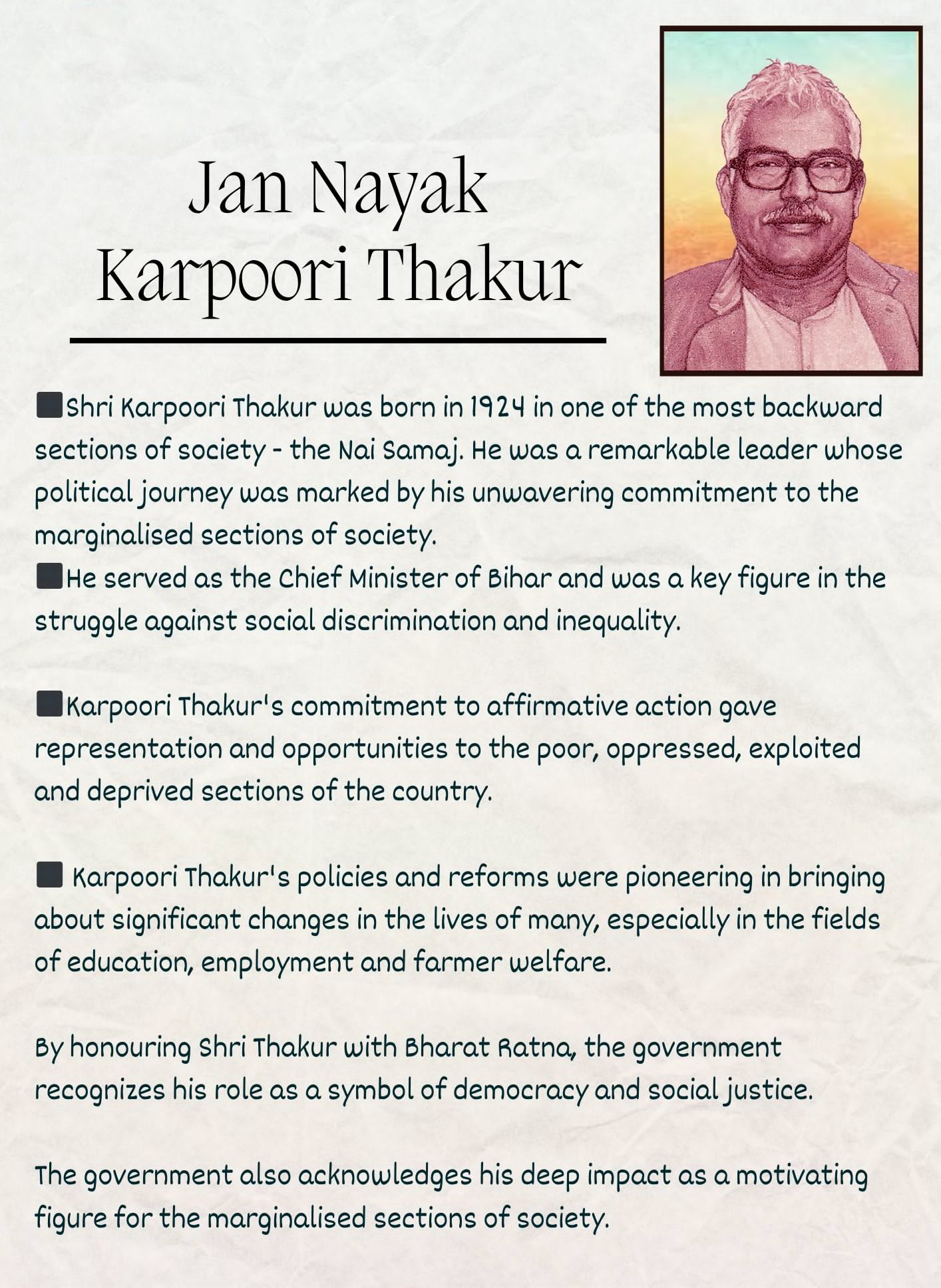Bharat Ratna to Karpoori Thakur | 29 Jan 2024
Why in News?
Recently, the President of India announced that the Bharat Ratna would be awarded to socialist leader and former Chief Minister of Bihar Karpoori Thakur, posthumously.
- This comes at a time when three-day celebrations are being held in Bihar to mark his birth centenary.
Who was Karpoori Thakur?
- About: Karpoori Thakur, called as “Jan Nayak”, was a prominent Indian politician who served as the 11th Chief Minister of Bihar twice, from 1970-71 and 1977-79.
- Early Life and Political Foundation (1942-1967): He was a freedom fighter and a staunch socialist who worked under the guidance of stalwarts such as Jayaprakash Narain, Dr Rammanohar Lohia and Ramnandan Mishra.
- Represented the Nai community, listed as an Extremely Backward Class (EBC) among OBCs.
- Entered politics in 1952, serving as a legislator until 1985.
- Represented the Nai community, listed as an Extremely Backward Class (EBC) among OBCs.
- Chief Ministerial Term and Policies: In 1977, during his Chief Ministership, Mungeri Lal Commission recommended reclassifying backward classes into extremely backward classes (including weaker sections of Muslims) and backward classes.
- In 1978, he introduced a groundbreaking reservation model, allocating 26% of reservations with specific quotas for OBCs, EBCs, women, and economically backward classes among upper castes.
- This reclassification was also seen as a percussor of the Mandal Commission report, advocating for 27% reservations for Other Backward Classes.
- Implemented wide-ranging policies, including the promotion of Hindi, and Urdu as the second official language, waiving school fees, and strengthening Panchayati Raj.
- In 1978, he introduced a groundbreaking reservation model, allocating 26% of reservations with specific quotas for OBCs, EBCs, women, and economically backward classes among upper castes.
What is Bharat Ratna Award?
- About: Bharat Ratna is the highest civilian award of the Republic of India.
- History and Evolution: Instituted in 1954, the award is conferred in recognition of exceptional service/performance of the highest order, without distinction of race, occupation, position, or sex.
- The award was originally limited to achievements in the arts, literature, science, and public services.
- But in December 2011, the government expanded the criteria to include any field of human endeavour.
- First Recipients: The first recipients of the Bharat Ratna were C. Rajagopalachari, Sarvepalli Radhakrishnan, and C. V. Raman, honoured in 1954.
- Most recently, in 2019, it was awarded to Nanaji Deshmukh, Bhupen Hajarika and Pranab Mukherjee.
- Key Aspects:
- It is not mandatory that Bharat Ratna be awarded every year.
- There is no written provision that Bharat Ratna should be awarded to Indian citizens only.
- The award has been awarded to a naturalized Indian citizen, Agnes Gonxha Bojaxhiu, better known as Mother Teresa (1980) and to two non-Indians - Khan Abdul Ghaffar Khan and Nelson Mandela (1990).
- Recommendations for Bharat Ratna are made by the Prime Minister of India to the President.
- The number of Bharat Ratna Awards is restricted to a maximum of three in a particular year.
- On conferment of the award, the recipient receives a Sanad (certificate) signed by the President and a medallion.
- The Award does not carry any monetary grant.
- In terms of Article 18 (1) of the Constitution, the award cannot be used as a prefix or suffix to the recipient's name.
- However, an award holder consider it necessary, using the following expression in their biodata/letterhead/visiting card etc. to indicate that he/she is a recipient of the award: Awarded Bharat Ratna by the President or Recipient of Bharat Ratna Award.
UPSC Civil Services Examination, Previous Year Questions (PYQs)
Q. Consider the following statements in respect of Bharat Ratna and Padma Awards: (2021)
- Bharat Ratna and Padma Awards are titles under the Article 18(1) of the Constitution of India.
- Padma Awards, which were instituted in the year 1954, were suspended only once.
- The number of Bharat Ratna Awards is restricted to a maximum of five in a particular year.
Which of the above statements are not correct?
(a) 1 and 2 only
(b) 2 and 3 only
(c) 1 and 3 only
(d) 1, 2 and 3
Ans: (d)

